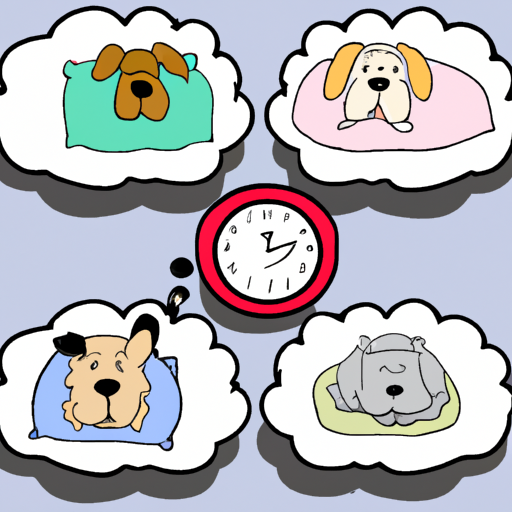As a dog owner, you’ve likely observed your canine companion snoozing throughout the day. You might even wonder, “how long do dogs sleep on average?“
- Table of Contents
- Understanding Sleep in Dogs
- Factors Affecting a Dog’s Sleep
- How Much Sleep is Too Much?
- Tips to Improve Your Dog’s Sleep
-
Frequently Asked Questions
-
Key Takeaways
- On average, dogs sleep for about 12 to 14 hours per day.
- Factors such as age, breed, and health can affect a dog’s sleep.
- Excessive sleep could be a sign of a health issue.
- Regular exercise and a comfortable sleep environment can improve your dog’s sleep.
Understanding Sleep in Dogs
Just like humans, dogs need adequate sleep for their health and well-being. On average, an adult dog sleeps between 12 to 14 hours per day. Puppies, on the other hand, require about 18 to 20 hours of sleep, as they expend a lot of energy exploring their new environment. Senior dogs also tend to sleep more, often due to health-related issues or lower energy levels.
However, these numbers are not set in stone, as sleep patterns can vary greatly among different breeds. For instance, large breeds like Labrador Retrievers and Saint Bernards tend to sleep more than smaller breeds.
Factors Affecting a Dog’s Sleep
Several factors can influence how much a dog sleeps.
- Age: As mentioned earlier, puppies and older dogs tend to sleep more than adult dogs.
- Activity Level: Active dogs or working breeds like Border Collies or German Shepherds may sleep less due to their high energy levels.
- Health: Dogs with health issues may sleep more than healthy dogs. If you notice a sudden change in your dog’s sleep pattern, it could be a sign of an underlying health issue and should be checked by a vet.
How Much Sleep is Too Much?
While it’s normal for dogs to sleep a lot, excessive sleep could be a sign of a potential health problem. This could range from diabetes, hypothyroidism to depression or heart disease. If you’re concerned about your dog’s sleep patterns, it’s always a good idea to consult with a veterinarian.
Tips to Improve Your Dog’s Sleep
- Regular Exercise: Regular physical activity can help regulate your dog’s sleep patterns. It helps them expend energy, reducing restlessness during the night.
- Comfortable Sleeping Environment: Just like humans, dogs sleep better in a comfortable, quiet environment. A good quality bed and a quiet space could help improve your dog’s sleep.
- Routine: Dogs thrive on routine. Regular feeding times, exercise, and bedtime can help regulate your dog’s body clock, improving their sleep.
Frequently Asked Questions
-
Do dogs dream?
Yes, dogs do dream. Research has found similarities between the sleep cycle of humans and dogs, suggesting that dogs also experience REM sleep, the stage where dreaming occurs. -
Why does my dog sleep so much?
Several factors could influence your dog’s sleep, including age, breed, and health. However, if you notice a sudden change in your dog’s sleep pattern, it’s advisable to consult a vet.
Remember, sleep plays a crucial role in your dog’s overall health. Whether they’re a sprightly young pup or a slow and steady senior, ensuring they get the right amount of sleep is key to their wellbeing. If you’re ever unsure about your dog’s sleep habits or if you notice any drastic changes, it’s always worthwhile to seek professional advice.



